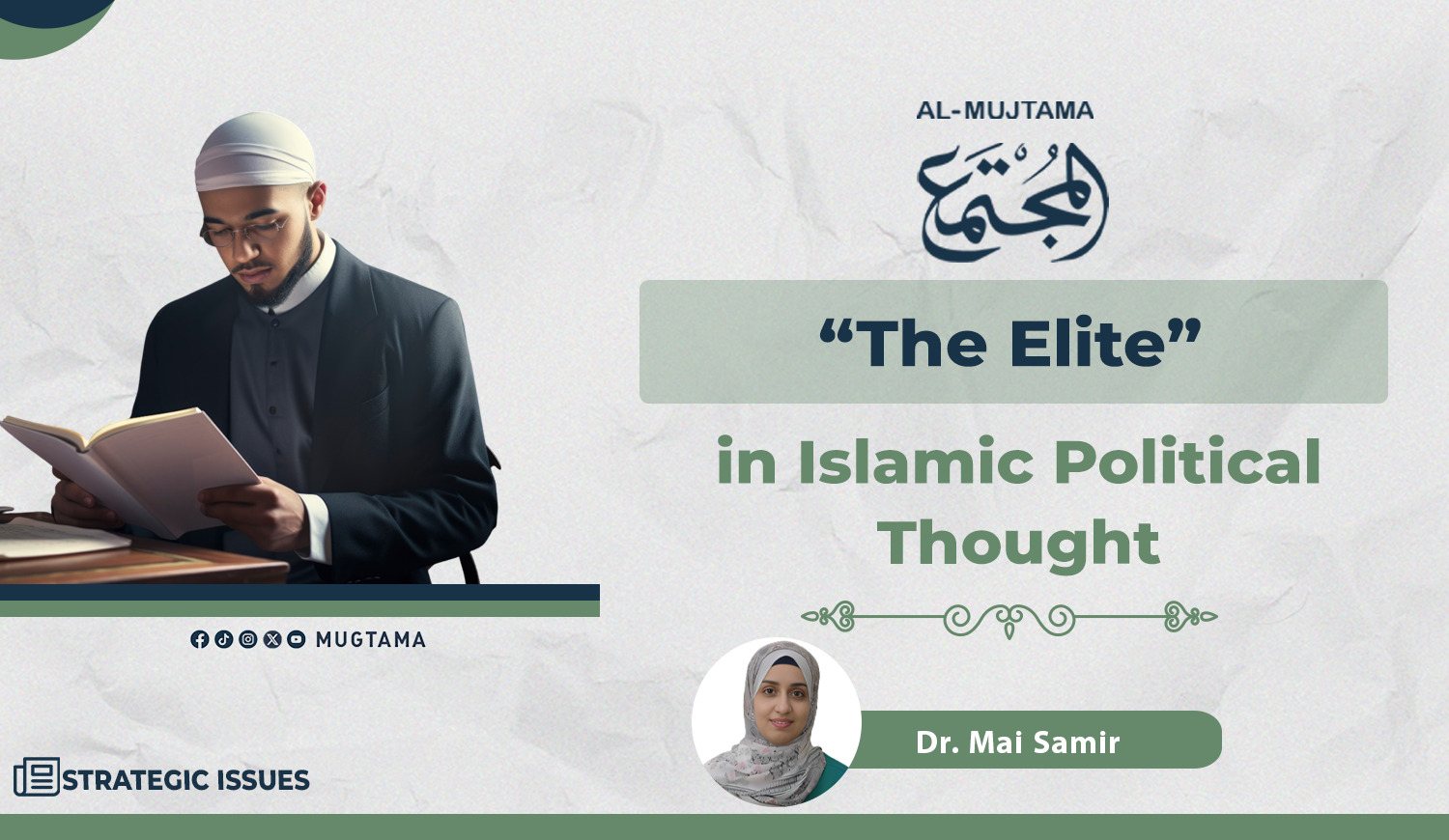Jurisprudence, Philosophy, and Literature
“The Elite” in Islamic Political Thought

Many researchers seeking an answer to the question: "Why
are Muslim societies burdened by ignorance and civilizational
backwardness?" attribute this to the political and cultural elite. This is
due to their calcification and the decline of their educational and
awareness-raising role in leading societies towards enlightenment,
understanding, and democratic transformation. The elite is the leadership that
guides society towards betterment, by virtue of the high education, deep
religious understanding, profound awareness of flaws, and ability to provide
effective solutions to problems that this elite possesses. Without them,
society becomes like a blind person, wandering aimlessly, stumbling in
darkness.
Islam recognized the essentiality of the elite early on,
giving special attention from the very beginning of its call to establishing
and forming an elite of believers who undertook the task of preserving
the Quran and receiving the Sunnah from the Prophet (peace be upon him). These
were the Companions (may Allah be pleased with them), who served as
advisors, ministers, and ambassadors for spreading the message.
After the passing of the Prophet (peace be upon him), his Rightly
Guided Caliphs quickly followed his Sunnah by adopting the principle of Shura
(consultation). They also affirmed the principle of Bay'ah (allegiance)
for the prominent and leading figures of the land, considering them the social
and political elite representing all Muslims. Since then, the principle of
Bay'ah has become one of the principles of Islamic governance.
This Islamic elitism reinforced the principle of Shura, which
meant the Caliph consulting those with sound opinions, experience, and
religious knowledge, each according to their specialization, in managing state
affairs and avoiding despotism in decision-making. This made Islamic rule in
its "Rightly Guided" or ideal form a highly progressive political
system by the standards of its time, and even our own era.
The Nature of the Elite in Islamic
Political Thought: Religious or Political?
The concept of the elite raises a set of questions about the
nature of these chosen few close to the circles of power in Islam. Are they a religious
elite in the theocratic sense—meaning are they of a higher religious degree
than the rest of humanity, like the monks and church fathers who had the right
to grant indulgences in Europe during what is called the "Dark Ages"?
Or are they a political elite by virtue of their proximity to the Caliph
and their participation in decision-making? Or are they a cultural elite
based on their scientific specialization and their profound knowledge in
various branches of science?
However, this problem might stem from an incorrect
understanding of the nature of the relationship between the religious and the
political in Islam, and its radical difference from that in Christianity. This
takes us back once again to the debate of secularism and Islam. Religion and
politics in Islam are interconnected, stemming from Islam's vision as a way of
life, encompassing both religion and worldly affairs. As long as there is no
separation between religion and state in Islam, it cannot be said that the
political elite is a secular elite. The Ahl al-Hall wal-Aqd (people who
untie and bind/solve and sanction) or scholars have always been synonymous with
jurists, as jurists were the primary elite in the Islamic state, being
the only group capable of applying the commands of Sharia to specific
situations.
Indeed, the position of the Caliph itself, in its most famous
definitions among Muslim thinkers, is "guarding the religion and managing
worldly affairs by it." Since the ability to exercise ijtihad (independent
reasoning), deduction, and analogy to reach a legal opinion concerning
unfolding events in Muslim lands was only available to jurists, they became an
entrenched Islamic elite.
The Islamic Elite: Between
Jurisprudence, Philosophy, and Literature
The criteria and characteristics of the Islamic elite in
Islamic political thought vary according to the intellectual background through
which the thinker engaged in ijtihad. Islamic political thought branched from
three intellectual sources: jurisprudence (fiqh), philosophy, and literature.
The nature of the jurists was characterized by a legal religious background,
and their writings appeared in works of "Al-Siyasa Al-Shar'iyyah"
(Islamic governance) and "Al-Ahkam al-Sultaniyyah" (Ordinances of
Government). These were lawful and judicial-legal, taking a practical
character, thus differing according to the demands of Muslim reality.
Meanwhile, philosophical writings were marked by idealism and
detachment from society. They produced theoretical and philosophical works on
virtuous rule and the virtuous city, largely influenced by Greek philosophy,
especially Plato and Aristotle.
As for the writings of literati, they were represented in
works of "adab al-nasiha" (advice literature) or "mirrors
for princes." These were presented in an aesthetically embellished
literary form, focusing on collecting summaries of wisdom from previous nations
and offering them as advice for rulers to adopt or not. Much of their advice
was drawn from the overall experiences of previous nations, especially the
Persians and Romans.
Ahl
al-Hall wal-Aqd
The elite took the form of "Ahl al-Hall wal-Aqd"
according to the jurists. Ibn Taymiyyah said: "Those in authority are of
two types: rulers and scholars," meaning jurists. Al-Mawardi, on the other
hand, emphasized that the Imamate "is established in two ways: one, by the
choice of the Ahl al-Hall wal-Aqd, and the second, by the designation of the
Imam from before."
Despite the lack of detailed conditions for the Ahl al-Hall
wal-Aqd by many jurists of Islamic politics, the general context of their
ijtihad indicated that these scholars of opinion and consultation possessed a
religious, jurisprudential, and legal background. This was not because they
held theocratic authority, but by virtue of their profound knowledge in Sharia,
Hadith, and Fiqh, and their ability to exercise ijtihad in applying the
requirements of Sharia to the daily lives of Muslims. It was also by virtue of
their representation of their communities as influential and respected figures
in the cities and countries where they lived. Some of them were jurists and
judges who also possessed noble lineage and good conduct. Therefore, the
opinions of these scholars and jurists were more likely to carry relative
weight than those of ordinary Muslims.
Philosopher-Rulers
Among the philosophers, and stemming from their philosophical
background, the elite was primarily intellectual and cultural. Wisdom,
sound reason, and philosophical ability were the basis for their selection. Ibn
Rushd agreed with Plato on the importance for the virtuous Islamic city to have
a class of "philosopher-rulers" who possess intellectual
virtue that qualifies them to consider practical matters in nations and cities.
This rational philosophical condition according to Ibn Rushd
is a main condition not only for the ruler, for the definition of a philosopher
is precisely the definition of a king, a lawgiver, and an Imam, all at once.
As for Al-Farabi, his intellectual elitism was reflected in
making a class of wise men for the virtuous city who possess a purely
intellectual and theoretical philosophical wisdom superior to all other people
in the city. They lead the people of the city to achieve virtue through this
demonstrative knowledge.
People of Opinion and Morality
On the other hand, the authors of "mirrors for
princes" paid special attention to guiding rulers to avoid associating
with bad companions and urged caliphs and governors to draw closer to and favor
people of sound opinion and religion. This was highlighted by Ibn al-Muqaffa'
in his letter to Caliph Abu Ja'far al-Mansur, "Risala fi al-Sahaba"
(Treatise on the Companions), where he laid down conditions for what the
companions of the Commander of the Faithful should be. These included "a
man whose honor, opinion, and work are worthy of the Commander of the
Faithful's council, discourse, and consultation; or a man of courage known for
it and prepared for it, combining courage with noble lineage and chastity; or a
righteous jurist to be placed among the people for them to benefit from his
righteousness and jurisprudence; or an honorable man who does not
corrupt." These are comprehensive qualities that did not focus solely on
religious jurisprudence as with the jurists, nor solely on theoretical
philosophical knowledge, but encompassed comprehensive virtues of intellect,
religion, lineage, and character alike.
Finally, we are in dire need today of a true elite that
understands its role as a mandate and duty to lead the nation towards
renaissance, rectification, and emergence from the slumber of ignorance, the
weakening of resolve, and the loss of ambition. If we reflect on the concept of
the elite in Islamic political thought across its three branches, a
comprehensive model is revealed that transcends traditional boundaries between
the religious and the political. It redefines leadership as an intellectual and
ethical responsibility before it is an authority. It views the elite as a
fundamental pillar of governance, not a mere formality, and considers bad
company a crucial factor in the corruption of a country and the loss of the
government's prestige.
Based on this vision, the elite can be re-understood, and
their social and political roles, which have been absent and obscured due to
the spread of ignorance, moral decay, and religious corruption, can be
restored.










